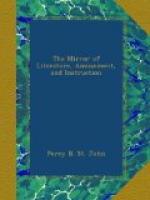In games of mingled calculation and hazard, the greater the advantages which a man seeks to obtain, the greater risks he must run. It is precisely this that renders the deceitful science of conquerors so calamitous to nations. Napoleon, though naturally adventurous, was not deficient in consistency or method; and he wasted neither his soldiers nor his treasures where the authority of his name sufficed. What he could obtain by negociations or by artifice, he required not by force of arms. The sword, although drawn from the scabbard, was not stained with blood, unless it was impossible to attain the end in view by a manoeuvre. Always ready to fight, he chose habitually the occasion and the ground. Out of fifty battles which he fought, he was the assailant in at least forty.
Other generals have equalled him in the art of disposing troops on the ground. Some have given battle as well as he did; we could mention several who have received it better; but in the manner of directing an offensive campaign he has surpassed all.
The wars in Spain and Russia prove nothing in disparagement of his genius. It is not by the rules of Montecuculii and Turenne, manoeuvring on the Renchen, that we ought to judge of such enterprises. The first warred to secure such or such winter-quarters; the other to subdue the world. It frequently behoved him not merely to gain a battle, but to gain it in such a manner as to astound Europe and to produce gigantic results. Thus political views were incessantly interfering with the strategic genius; and to appreciate him properly we must not confine ourselves within the limits of the art of war. This art is not composed exclusively of technical details; it has also its philosophy. To find in this elevated region a rival to Napoleon, we must go back to the times when the feudal institutions had not yet broken the unity of the ancient nations. The founders of religions alone have exercised over their disciples an authority comparable with that which made him the absolute master of his army. This moral power became fatal to him, because he strove to avail himself of it even against the ascendancy of material force, and because it led him to despise positive rules, the long violation of which will not remain unpunished.
When pride was hurrying Napoleon towards his fall, he happened to say, “France has more need of me than I have of France.” He spoke the truth. But why had he become necessary? Because he had committed the destiny of the French to the chances of an interminable war; because, in spite of the resources of his genius, that war, rendered daily more hazardous by his staking the whole of his force, and by the boldness of his movements, risked in every campaign, in every battle, the fruits of twenty years of triumph; because his government was so modelled that with him every thing must be swept away, and that a re-action proportioned to the violence of the action must burst forth at once both within and without. The mania of conquest had reversed the state of things in Europe; we, the eldest born of liberty and independence, were spilling our blood in the service of royal passions against the cause of nations, and outraged nations were turning round upon us, more terrible from being armed with the principles which we had forsaken.




